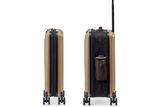Adrian Weckler: Status update - no more unlimited free food at Meta in Dublin
Technology





There are signs the lavish lifestyle enjoyed by Meta Dublin staff may be over. The company has cut down on food perks which, at one point, were the envy of every other professional organisation in Ireland.
From being the high point of tech culinary opulence, the nosh repository has been principally cut to one main canteen, while staff have been told they are not allowed to bring goodies home, which some are now grumbling about.
What a difference a few years makes. I remember how close to the ground my jaw had dropped the first time I visited Meta’s – then Facebook’s – Dublin headquarters.
With high-end chefs in the lavish kitchens, and sky-high optimism about the place, the company offered a different world menu every day.
Meta offices were once the apex of tech culinary opulence. Pictured, the Facebook international office on Hanover Reach in Dublin in 2013. Photo: El Keegan
This was supplemented by umpteen smaller eateries, fridges, mini-cafés and other snack repositories throughout the building.
The guiding idea was that feeling peckish, or having to go somewhere disruptingly far outside your workzone for food, shouldn’t ever be a reason to derail a spurt of creativity or industry.
Fast forward to 2024 and it’s a whole different story.
In day-to-day office life, Meta now resembles something a little more like a telco.
The food is still available and good, but the exuberant atmosphere is over. No unconditional free snacks for everyone anymore.
Read more
This rhymes with the general mood of belt-tightening economy sweeping through the Irish office in general, kicked off by two fairly savage rounds of layoffs – where almost a third of staff were let go – a year ago.
Was the part-Disneyland scenario experienced up until recently just an historical anomaly?
From a staffing perspective, the company has yet to fully recover, with the new headquarters in Dublin’s leafy Ballsbridge only being part-occupied by the company itself.
Ironically, from a business perspective, things are looking better now for Meta than they have in a long, long time.
Its most recent quarterly results last month were at blowout level, showing a massive 25pc hike in revenue and a tripling of its profitability to over €1bn per week.
Anyone who bought Meta shares a year ago has more than doubled their investment; anyone who took a punt six months ago has seen the value of their shares rise 65pc.
Why have things turned around so favourably for Mark Zuckerberg’s company, which was bogged down with fears of being lumbered with a dud investment (the Metaverse) and with regulatory walls closing in all over the world?
Threads is now outperforming X (formerly Twitter) by 8 to 1 in app downloads. Photo: Getty Images
A glance at some of the company’s performance ratings gives a clue. Audiences for Facebook and Instagram, in particular, are up; Instagram’s Reels – a copycat feature from TikTok – has performed spectacularly well. So well, in fact, that Instagram overtook TikTok in global app downloads to become the biggest app of 2023, something many of us thought it couldn’t do.
And although Meta still can’t make any meaningful revenue from WhatsApp in Europe, its latest copycat app – Threads, which mimics the core functionality of Twitter – is now starting to pick up steam.
According to the most authoritative app measurement analytics firm, Sensor Tower, Threads is now outperforming X (formerly Twitter) by 8 to 1 in app downloads.
While still only a fraction of X’s size (14 million daily active users compared to X’s 154 million daily users), that gap is narrowing, with X down 15pc since Elon Musk took over and drove a significant chunk of users – and almost all major advertisers – away.
Like other copycats from Meta, I am starting to find Threads genuinely useful and now post there for work and social reasons as often as I do on X.
So Meta, comparatively, is in pretty rude business health and looks like being a solid performer
The overarching point here is that Mark Zuckerberg, for all the criticism and noise he attracts, appears to be an unparalleled operator in the long-term running of a social networking company.
He seems to have successfully defended Meta’s half of the global online advertising duopoly, against some pretty formidable threats.
So Meta, comparatively, is in pretty rude business health and looks like being a solid performer in the short to medium term.
X is down 15pc since Elon Musk took over and drove a significant chunk of users – and almost all major advertisers – away. Photo: Getty Images
Can this be reflected again anytime soon in the working conditions that Meta staff enjoy in Dublin?
Or was the part-Disneyland scenario experienced up until recently just an historical anomaly that has been permanently adjusted by more old-fashioned, besuited local business managers?
Probably not for a while. When he was canning hundreds of Irish workers last year, Zuckerberg promised that the company would start hiring again in numbers soon.
That moment hasn’t quite come yet, with only 24 open positions for Dublin – a tiny fraction of the hundreds on offer for much of the last five years.
But everything else points to better times soon.
Join the Irish Independent WhatsApp channel
Stay up to date with all the latest news
















